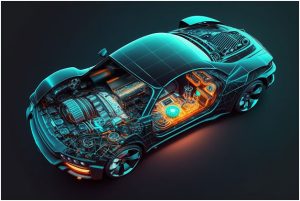Automotive engineering is a rapidly evolving field, driven by technological advancements and a growing emphasis on sustainability and efficiency. From electric vehicles to autonomous driving systems, innovations in automotive engineering are reshaping the future of transportation. This article explores the latest breakthroughs in automotive technology, highlighting their impact on vehicle performance, safety, and the environment.
Electric and Hybrid Vehicles
Electric and hybrid vehicles represent one of the most significant innovations in automotive engineering. These vehicles utilize advanced battery technology and electric drivetrains to reduce reliance on fossil fuels and decrease emissions.
Advancements in Battery Technology
Recent developments in battery technology have greatly enhanced the performance and range of electric vehicles (EVs). Innovations such as solid-state batteries, which offer higher energy density and faster charging times, are paving the way for more efficient and longer-lasting electric vehicles. Additionally, improvements in battery recycling processes are contributing to a more sustainable lifecycle for EV batteries.
Hybrid Powertrains
Hybrid vehicles combine internal combustion engines with electric motors to improve fuel efficiency and reduce emissions. Innovations in hybrid powertrains include more sophisticated energy management systems and the integration of regenerative braking technology, which captures and reuses energy that would otherwise be lost during braking.
Autonomous Driving Systems
Autonomous driving technology is transforming the way we approach vehicle safety and convenience. Self-driving cars rely on a combination of sensors, cameras, and artificial intelligence (AI) to navigate and make decisions without human intervention.
Advanced Sensor Technologies
Autonomous vehicles use a variety of sensors, including lidar, radar, and cameras, to perceive their surroundings and detect obstacles. Innovations in sensor technology have improved the accuracy and reliability of these systems, enabling safer and more precise autonomous driving.
AI and Machine Learning
AI and machine learning algorithms play a crucial role in autonomous driving systems. These technologies analyze data from sensors and cameras to make real-time decisions and adapt to changing driving conditions. Advances in AI are enhancing the capabilities of autonomous vehicles, making them more capable of handling complex driving scenarios.
Connectivity and Infotainment Systems
Modern vehicles are increasingly equipped with advanced connectivity and infotainment systems that enhance the driving experience and provide seamless integration with mobile devices.
In-Car Connectivity
In-car connectivity features, such as smartphone integration and wireless communication, allow drivers to access navigation, entertainment, and communication services directly from their vehicles. Innovations like 5G connectivity are further improving the speed and reliability of in-car communications, enabling real-time updates and enhanced driver assistance.

Advanced Infotainment Systems
Infotainment systems are becoming more advanced, with features such as voice recognition, touchscreens, and customizable interfaces. These systems provide drivers with a range of multimedia options and enhance overall driving comfort. Recent innovations include augmented reality navigation and advanced driver assistance system (ADAS) integration, which provide additional support and information to drivers.
Enhanced Driver Assistance Systems (ADAS)
ADAS technologies are designed to assist drivers and improve safety by providing features such as adaptive cruise control, lane-keeping assistance, and automatic emergency braking.
Collision Avoidance Systems
Collision avoidance systems use sensors and cameras to detect potential obstacles and prevent accidents. Innovations in this area include advanced automatic braking systems and improved object detection algorithms, which enhance the effectiveness of these safety features.
Adaptive Cruise Control
Adaptive cruise control systems use radar and sensors to maintain a safe distance from other vehicles while cruising. Recent advancements in this technology include the ability to adjust speed based on traffic conditions and road features, providing a smoother and safer driving experience.
Green Technologies and Sustainable Practices
The automotive industry is increasingly focused on reducing its environmental impact and promoting sustainability. Innovations in green technologies and sustainable practices are helping to achieve these goals.
Alternative Fuels
Alternative fuels, such as hydrogen and biofuels, offer a more sustainable option compared to traditional gasoline and diesel. Innovations in fuel cell technology and biofuel production are making these alternative fuels more viable for widespread use, contributing to a reduction in greenhouse gas emissions.
Recycling and Waste Reduction
Automotive manufacturers are implementing recycling and waste reduction strategies to minimize their environmental footprint. Innovations include the development of recyclable materials for vehicle components and improved manufacturing processes that reduce waste and energy consumption.
Emerging Technologies and Trends
As automotive engineering continues to advance, several emerging technologies and trends are expected to shape the future of transportation.
Vehicle-to-Everything (V2X) Communication
V2X communication technology enables vehicles to communicate with each other and with infrastructure, such as traffic signals and road sensors. This technology has the potential to improve traffic flow, reduce accidents, and enhance overall road safety.
Smart and Connected Vehicles
Smart and connected vehicles are expected to become more prevalent, with advanced features such as vehicle-to-grid (V2G) integration and enhanced telematics. These technologies will enable vehicles to interact with their environment in new and innovative ways, contributing to a more connected and efficient transportation network.
Innovations in automotive engineering are driving significant advancements in vehicle performance, safety, and sustainability. From electric and hybrid vehicles to autonomous driving systems and advanced connectivity features, these technological breakthroughs are reshaping the future of transportation. As the automotive industry continues to evolve, these innovations will play a crucial role in creating a more efficient, safe, and environmentally friendly driving experience. Embracing these advancements will help shape a better future for mobility and transportation.


